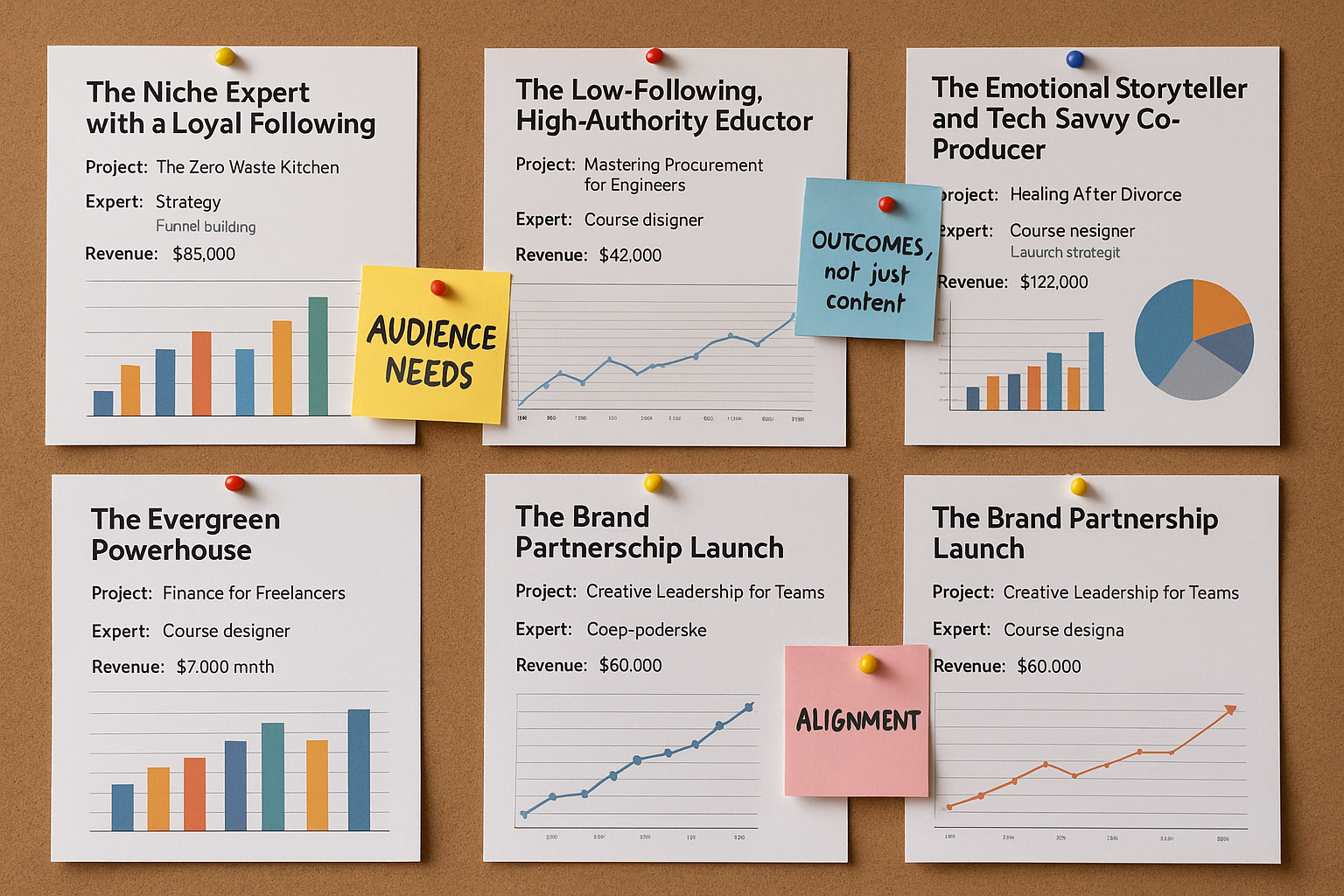Not all digital course co-productions are created equal. Some barely get off the ground, while others turn into powerful long-term businesses. But what exactly makes a co-production successful? Is it just about the sales? The expert’s influence? The co-producer’s strategy?
In this article, we explore five types of successful co-productions — real and fictionalized composites inspired by market patterns — to help you understand what worked, why it worked, and what you can take away as a co-producer building your own path.
Case 1: The Niche Expert with a Loyal Following
Project: “The Zero Waste Kitchen”
Expert: A sustainability influencer with 120K followers on Instagram
Co-Producer’s Role: Strategy, funnel building, email marketing, platform setup
Revenue: $85,000 in the first launch
Why it worked:
The co-producer understood the audience’s real pain: eco-conscious home cooks didn’t need more recipes — they needed systems. Together, they created a 5-week transformation framework rather than a library of videos.
Lesson:
Don’t just package content. Package outcomes. Position the course as a transformation aligned with the expert’s voice.
Case 2: The Low-Following, High-Authority Educator
Project: “Mastering Procurement for Engineers”
Expert: A university professor with only 800 LinkedIn followers
Co-Producer’s Role: Course designer, launch strategist, B2B connector
Revenue: $42,000 in the first corporate cohort
Why it worked:
Instead of going direct to consumers, the co-producer built a B2B outreach plan. They pitched the course as internal training to five engineering firms — three signed contracts.
Lesson:
You don’t need a massive audience. You need a buyer. Map the expert’s credibility to a high-value niche and explore alternative sales channels.
Case 3: The Emotional Storyteller and the Tech-Savvy Co-Producer
Project: “Healing After Divorce”
Expert: A therapist who had gone through a highly public divorce and gained media attention
Co-Producer’s Role: Responsible for automation, sales page copy, storytelling in the launch sequence
Revenue: $122,000 in 3 launches
Why it worked:
The co-producer leaned into vulnerability and emotional connection. The webinar didn’t just “teach” — it connected. The storytelling wasn’t a marketing trick; it was the brand’s soul.
Lesson:
Emotions sell when they are sincere. Don’t be afraid to build emotional resonance in your messaging — especially if the expert has lived experience.
Case 4: The Evergreen Powerhouse
Project: “Finance for Freelancers”
Expert: A former banker turned creator
Co-Producer’s Role: Setup of a full evergreen funnel (ads, VSL, email sequence, webinar replay)
Revenue: $7K/month consistently for over 2 years
Why it worked:
Instead of launching big, they launched small and optimized relentlessly. The course didn’t depend on urgency — it solved an always-present problem. With smart segmentation, they personalized emails and increased conversion.
Lesson:
Evergreen requires patience and precision. It’s not set-it-and-forget-it — it’s set-it-and-obsess-over-it. Start lean, then scale with data.
Case 5: The Brand Partnership Launch
Project: “Creative Leadership for Teams”
Expert: A leadership coach and podcast host
Co-Producer’s Role: Created a partnership with a major software brand to co-promote
Revenue: $60K in the first launch + long-term licensing deal
Why it worked:
The co-producer thought beyond social media. By identifying a software brand aligned with leadership development, they created a co-marketing deal that gave instant visibility and credibility.
Lesson:
Think beyond paid ads and personal audience. Strategic alliances and licensing can turn one launch into long-term income.
What Do These Cases Have in Common?
- A deep understanding of audience needs
- Co-producers who played to their strengths
- Clear roles between expert and co-producer
- Focus on outcomes, not just content
- Long-term thinking from the start
Final Insight
Successful co-productions aren’t just about launch day — they’re about alignment, problem-solving, and co-creation. Your job as a co-producer is to see the potential the expert can’t yet see, and to turn their knowledge into something that changes lives and builds revenue.
Whether you’re just starting out or optimizing your fifth project, study success — then adapt it to your context, your voice, and your audience.
Tags
coproduction, courseexamples, casestudy, expertcollaboration, digitalproducts, onlinecourses, coursemarketing, funnelstrategy, evergreenlaunch, coursebusiness

